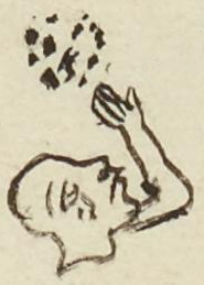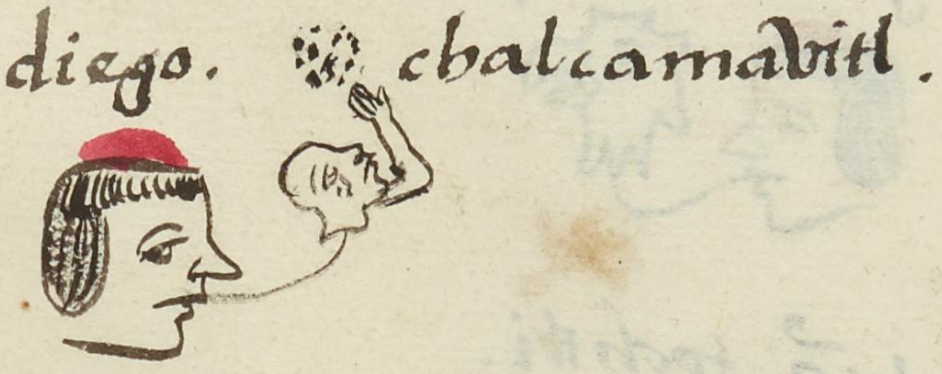Chalcamahuitl (MH669v)
This black-line drawing of the simplex glyph for the personal name Chalcamahuitl (perhaps “Takes Chances” or “Gambler”) is attested here as a man’s name. The glyph shows the head of what is probably a man looking upward, with his arm reaching up to a group of small bits of something. These are probably jade/green stones or beads made from these stones, given the gloss (chalcamahuitl), which refers to one who plays with such things, taking chances, so possibly a gambler. The term can also refer to someone who mocks others (burlón, in Spanish), according to Orozco y Berra (1880, 464). The head of the man is fairly bald, and he may have tears on his cheeks. This could point to some type of vulnerability or perhaps an ethnicity. The term Chalca refers to people from Chalco.
Stephanie Wood
This term chalcamahuitl is somewhat reminiscent of tapalcaahuiltia, which refers to children playing with bits of tile or broken shells, probably objects found on the ground. But to play with jade, which is precious, takes the game to an adult level. Orozco y Berra calls one who plays with chalchihuitl a chancero, one who takes chances, or a burlón, a mocker.
Stephanie Wood
diego. chalcamahuitl
Diego Chalcamahuitl
Stephanie Wood & Jeff Haskett-Wood
1560
Jeff Haskett-Wood
gamble, gambler, jugar, jades, chalchihuites, nombres de hombres

chalcamahui(tl), one who plays with jade, or one who takes chances, https://nahuatl.wired-humanities.org/content/chalcamahuitl
chalchihu(itl), precious green stones, jade, jadeite, https://nahuatl.wired-humanities.org/content/chalchihuitl
mahuiltia, to play, https://nahuatl.wired-humanities.org/content/mahuiltia
tapalcaahuiltia, to play with bits of tile or broken shells, https://nahuatl.wired-humanities.org/content/tapalcaahuiltia
tapalca(tl), a potsherd or broken tile, https://nahuatl.wired-humanities.org/content/tapalcatl
Chancero
Stephanie Wood
Matrícula de Huexotzinco, folio 669v, World Digital Library, https://www.loc.gov/resource/gdcwdl.wdl_15282/?sp=419&st=image.
This manuscript is hosted by the Library of Congress and the World Digital Library; used here with the Creative Commons, “Attribution-NonCommercial-ShareAlike 3.0 License” (CC-BY-NC-SAq 3.0).



